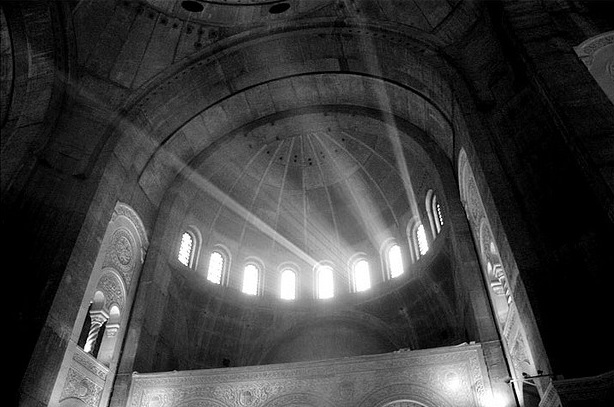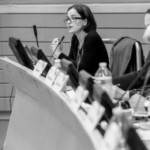Keep your distance: on the relationship between European integration and religion
The European continent has a history of religious entanglement and change, while its recent past has been in large part defined by the experience of European integration. But how do the two interact? Simona Guerra argues that EU integration can become a turning point for religiosity, and widen the gap between that part of the society moving towards more secularism and anti-secular and conservative groups.

Credit: Motoyen, CC BY 2.0
Comparative analyses on the involvement of religious actors across societies is quite infrequent, despite the role of religion itself is fundamental in the examination of identity, the state and institutional actors in comparative political studies. This is critical in post-Communist Europe where the repression of the Churches from the Communist regime froze affiliations, but it could not halt people’s beliefs in countries like Poland. Religion became the symbol of national unity and opposition to the Soviet regime, and religious beliefs could persist and re-emerge during the democratic transition. If religion could possibly no longer represent an important factor impacting on mass political behaviour, it still represented a salient cultural and institutional force during the process of democratization.
Studies on attitudes towards European integration have generally neglected religion as an independent variable (with some notable exceptions in the American literature); when it is studied, the standard assumption is that religion tends to strengthen support for European integration. Yet, religion affects attitudes and behaviours, and the relationship between the European Union (EU) and the Churches is increasingly described as ‘endemically’ Eurosceptic, due to the Churches’ status, disillusion with secular, or atheist, Europe and a dominant national sovereignty on ethical issues.
The Churches’ status was regulated only with the Treaty of Amsterdam (1997); with Amsterdam, the EU ‘respects and does not prejudice the status under national law of churches and religious associations or communities in the Member States’, but debates around identity are still high on the agenda of religious institutions and representations. The Commission of the Bishops’ Conferences of the European Community (COMECE) and The Conference of European Churches (CEC) supported the Treaty of Lisbon (2009), but expressed their reservations on the developing progressive philosophy of the EU pointing to the Charter of Fundamental Rights and the last draft of the Preamble, which simply read and referred to ‘Europe’s cultural, spiritual and humanist’ heritage. In particular, CEC observed the ‘degeneration’ of European integration more as a market, lacking core values. This secular dimension of the European Union (EU) also affects shares of the Catholic Church community, with people worried of increasing normative integration on possible issues as abortion, euthanasia and gay marriage.
At the end of the 1990s, Jeff Haynes pointed to the progress of secularization, with decreasing political and social significance of religious institutions. Jose Casanova observes that joining the EU when the process of secularization is taking place provides the Churches with more chances to enter the political and social discourse. Previous analysis
I have suggested in previous articles ( in 2012 and 2013) that the alliance between a conservative or radical-right party and the ultra-conservative Church can enter the social and political discourse in the run-up to EU accession and after it, and influence the domestic religious discourse – that can oppose the process of EU integration – when there is no alternative credible Eurosceptic actor within the domestic political arena.
That follows a similar path to that of Western European countries after World War II; the Roman Catholic Church, as an interest group, sought to pursue a strategy and an alliance through political parties in order to establish its authority on the political debate, and influence the social and cultural agenda. An ultra-conservative discourse can raise its salience in the political debate as source of common identity, attach to Euroscepticism (as oppositition towards the EU) and influence a Eurosceptic narrative in the public discourse. In particular, religious institutions can be willing to join the political debates to influence the cultural and social agenda at a time when religiousness can increase, but the Church may lose believers, in a form of religious individualization that is termed ‘believing without belonging’.
Recent comparative studies underline that religiosity has an ambivalent political attitude and cannot be understood as a one-facet phenomenon. Different components of religious attitudes can combine with different attitudes towards democracy and opposing views. On one hand, religious belonging, personal involvement in social networks, and an engaged civic attitude, influenced by religiosity, can also impact on more positive attitudes towards democracy, on the other religion influences conservative values that would oppose liberal ideas and support order (in opposition to democratic values). These can be triggered by the process of EU integration, when membership can be perceived as a threat to national values.
This explanation does not seem to be sufficient to impact on Eurosceptic attitudes, but it can represent a factor influencing the Eurosceptic discourse of religious actors. Opposition based on identity is likely to emerge across conservative right and extreme-right wing political parties, as Euroscepticism can address sovereignty and national values in the run-up to accession. In the case of Poland, Catholicism was encapsulated in Polish identity; the Catholic Church could play the role of strengthening national identity and political resistance against the Soviet regime. While the democratization process and the EU represented a promotion of pluralist and secular society, the Catholic Church felt challenged in its role of spiritual, but also social, cultural and political guide, as it was during the Soviet regime. Citizens perceived that the Church could not cope with the new challenges of contemporary life and although religious actors could still guide citizens’ spiritual life, they were perceived as unable to address contemporary political and social debates.
The process of EU integration develops contrasting attitudes within the Catholic Church that may feel challenged by the process of democratization and modernization. The EU may be perceived as a secular organization or threaten national sovereignty and the Church or religious actor can choose to join the Eurosceptic political debate to defend Catholicism and national values. The recent and next enlargements towards the Western Balkans can offer further interesting case studies. In Croatia the Catholic Church gave the image of an ‘extremist ethnoreligious country’ particularly infamous for its ‘clerical fascism’, where the process of democratization and nation-state building rewrites the past and views the revival of religious life and actors into public life.
Just five months after joining the EU (1 December 2013), Croatia voted to introduce the statement that marriage is only the union between a man and a woman, after the referendum was called ‘on the basis of 750,000 signatures collected by the conservative civic initiative “On behalf of the family”, which had support of the Catholic Church and right-wing political parties. But in July 2014, the Croatian Parliament passed the new law recognizing life partnership for same-sex couples (Life Partnership Act) that clearly signalled the way EU integration can become a turning point for religiosity, and widen the distance between that part of the society moving towards more secular and liberal attitudes and those groups that may try to resist secularization by assuming more conservative stances.
—
This post represents the views of the author and not those of Democratic Audit or the LSE. Please read our comments policy before posting.
—
 Simona Guerra is a Lecturer in Politics at the Department of Politics and International Relations, University of Leicester. Her main research interests focus on the domestic politics of EU integration, Euroscepticism and Religion and Politics. Her next book, co-edited with Simon Usherwood and Nick Startin, Euroscepticism in the EU: New Dimensions in Opposition to European Integration is forthcoming with Edward Elgar, and she is currently completing her second monograph, Religion and Euroscepticism in Post-Communist Europe (Routledge).
Simona Guerra is a Lecturer in Politics at the Department of Politics and International Relations, University of Leicester. Her main research interests focus on the domestic politics of EU integration, Euroscepticism and Religion and Politics. Her next book, co-edited with Simon Usherwood and Nick Startin, Euroscepticism in the EU: New Dimensions in Opposition to European Integration is forthcoming with Edward Elgar, and she is currently completing her second monograph, Religion and Euroscepticism in Post-Communist Europe (Routledge).





 Democratic Audit's core funding is provided by the Joseph Rowntree Charitable Trust. Additional funding is provided by the London School of Economics.
Democratic Audit's core funding is provided by the Joseph Rowntree Charitable Trust. Additional funding is provided by the London School of Economics.
… [Trackback]
[…] Read More here: democraticaudit.com/?p=13113 […]
Comparative analyses on the involvement of religious actors across societies is quite infrequent, despite the… https://t.co/5KJWW39KlD
Keep your distance: on the relationship between European integration and religion – Democratic Audit UK https://t.co/cARQUVMZHs
Keep your distance: on the relationship between European integration and religion https://t.co/M8AlEYHK7N
#Catholic #Christian Keep your distance: on the relationship between European integration and… https://t.co/G1CPew960y #News #Headlines
Keep your distance: on the relationship between European integration and religion https://t.co/i6W8RQkylU #Option2Spoil
Keep your distance: on the relationship between European integration and religion https://t.co/paE0NegZH4